
Boxed Out Among Friends and Lovers
by Patricia Vaccarino
Book lovers find more than solace in a book. They want to own the object of their desire and are quick to remember where they bought their first book. Buying a book for the first time is an experience mysteriously riddled with emotion. Book lovers might harken back to that occasion with as much emotion as they would remember a first love. They will remember every nuance of their first encounter with a bookstore, from the sound of a cash register’s ring, to the slight crinkling noise of the book being stowed into a paper bag, and how the store looked in the late afternoon light with its thick shades rolled up or slightly tattered and fading, curling down. They recall the scent of new books with shiny, bright covers or old musty tomes with yellowed pages as conjuring as much emotion as the scent of their lovers’ hair. People who love books love them that much.
People who love books feel very much at home in community bookstores. Independent “indie” bookstores transcend the book buying experience beyond being a financial transaction by giving people a place to experience books. In this way, indie bookstores are crucial for creating community around books. The number of indie bookstores in a town or city often mirrors the demographics of a culture. For example, the city of Yonkers, where I grew up, borders the Bronx and is the fourth most populous city in New York State; yet, it only has one bookstore, a Barnes &Noble, which is hardly an indie. The complete absence of indie bookstores might be a reflection of the city’s roots in a working-class culture. Whereas cities like Boston, San Francisco and Seattle have many indie bookstores, which could be a reflection of their highly educated populations.
In Seattle’s historic Pioneer Square district, John Siscoe, with his wife Carolyn, owns The Globe Bookstore. He defines his customers as regulars (booklovers) and slightly confused tourists who might have wandered away from the beaten trek. About the regulars, John said, “Some I’ve known for 30 years. They used to be a real important source of the life of the store. It’s not mine or Carolyn’s life. It’s the customers—the contact between the people and the books that are on the shelves. The best thing I can do is to say out of the way of the customer and the book—people build relationships with books and with each other. A conversation starts over the book.”
The Globe Bookstore has been around since 1979, but actually started its business in a small storefront in the University District before moving to Pioneer Square in 2005. The Pioneer Square neighborhood has been hard hit from the pandemic. The droves of tourists and high-tech workers are gone. Pandemic notwithstanding, the historic brick building where The Globe resides is slated for renovation and all of its tenants are moving out. Siscoe is moving his bookshop back to the University District in the original space that he has held onto all of these years. His regulars will undoubtedly follow him back to the bookstore’s original home. The Globe is unique in that it offers both new and used books. While its inventory leans heavily toward literature, history and children’s books and cook books, its true charm lies in browsing through its eclectic, well curated collection and the joy of discovering amazing hidden gems that leap out from among its shelves.
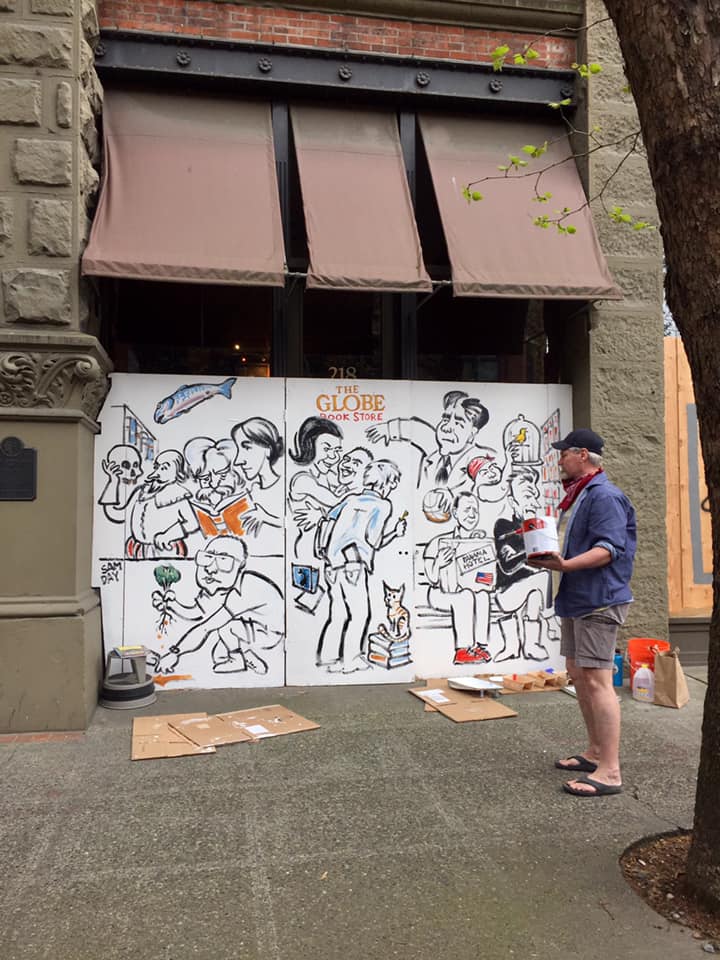
No matter where indie bookstores are tucked into the fabric of a neighborhood, many are now in danger of closing. The American Booksellers Association (ABA) recently launched the “Boxed Out” Campaign. The campaign’s name “Boxed Out” refers to the army of Amazon brown cardboard boxes that are dropped off on doorsteps everywhere like swarms of locusts. The “Boxed Out” campaign aims to drive awareness for indie bookstores so that they can stay in business.
Indie bookstores have been under siege for some time, first from Amazon’s increasing dominance in the book industry, then along came the pandemic. States that were forced into shutdown did not declare bookstores to be essential businesses. Hard hit by the closures, it is estimated that 20% of independent bookstores across the country will go out of business. In fact, since the pandemic began, more than one indie bookstore has closed each week. While the proximate cause of death for indie bookstores will be classified as casualties of Covid-19, the preexisting condition that hastened death is Amazon.
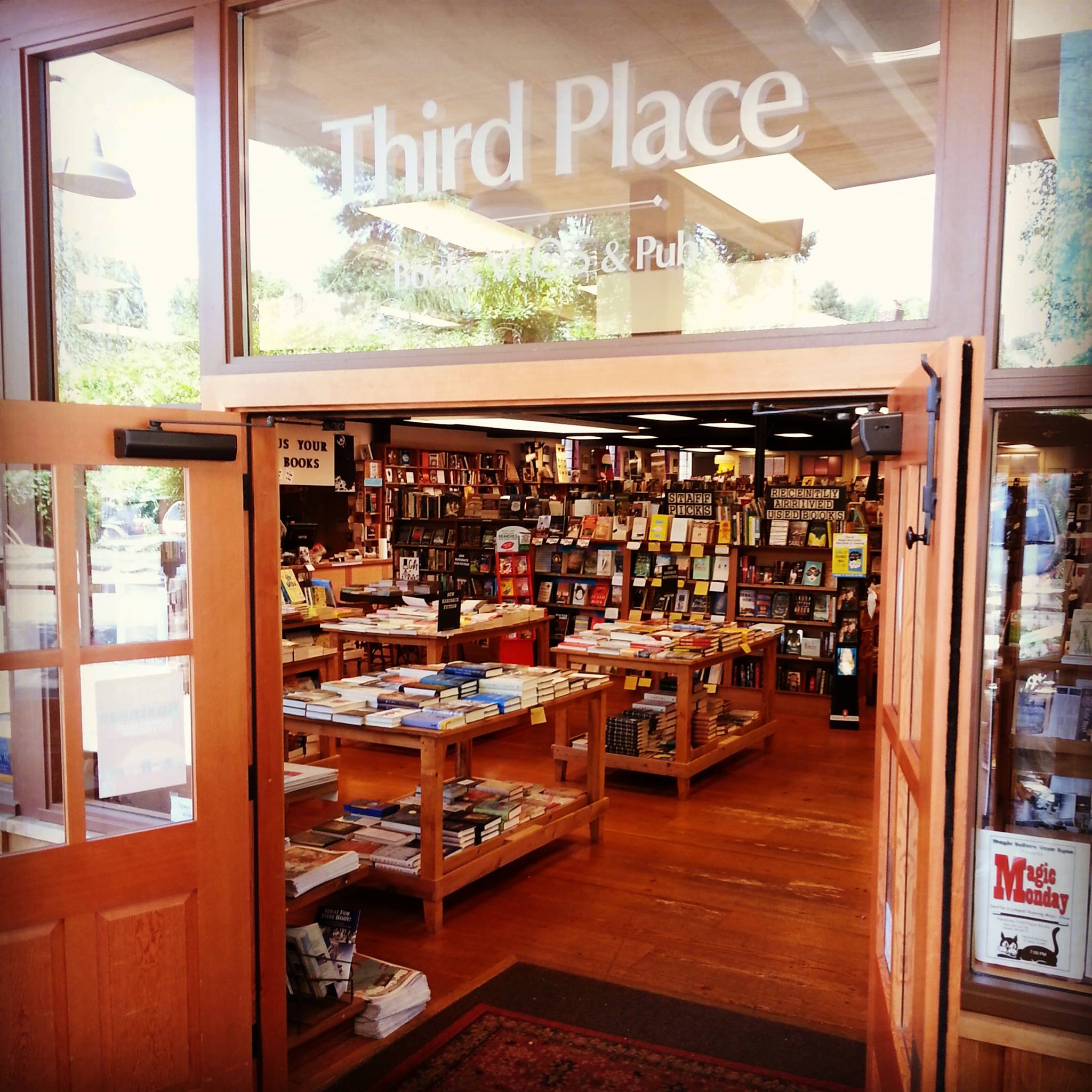 Hopefully the Boxed Out campaign will raise more awareness for indie bookstores among regular consumers. Let’s call them the potential friends of bookstores who will spread their dollars among indie bookstores as a way of keeping people in jobs and small shop owners in business. Book lovers, on the other hand, are already keeping indie bookstores alive. Book lovers who lust after books tend to have an uncanny attraction to frequent their favorite bookstores. One reason why indie bookstores resonate so well with book lovers is because their owners go beyond the purely transactional by extending invitations to open conversations about books.
Hopefully the Boxed Out campaign will raise more awareness for indie bookstores among regular consumers. Let’s call them the potential friends of bookstores who will spread their dollars among indie bookstores as a way of keeping people in jobs and small shop owners in business. Book lovers, on the other hand, are already keeping indie bookstores alive. Book lovers who lust after books tend to have an uncanny attraction to frequent their favorite bookstores. One reason why indie bookstores resonate so well with book lovers is because their owners go beyond the purely transactional by extending invitations to open conversations about books.
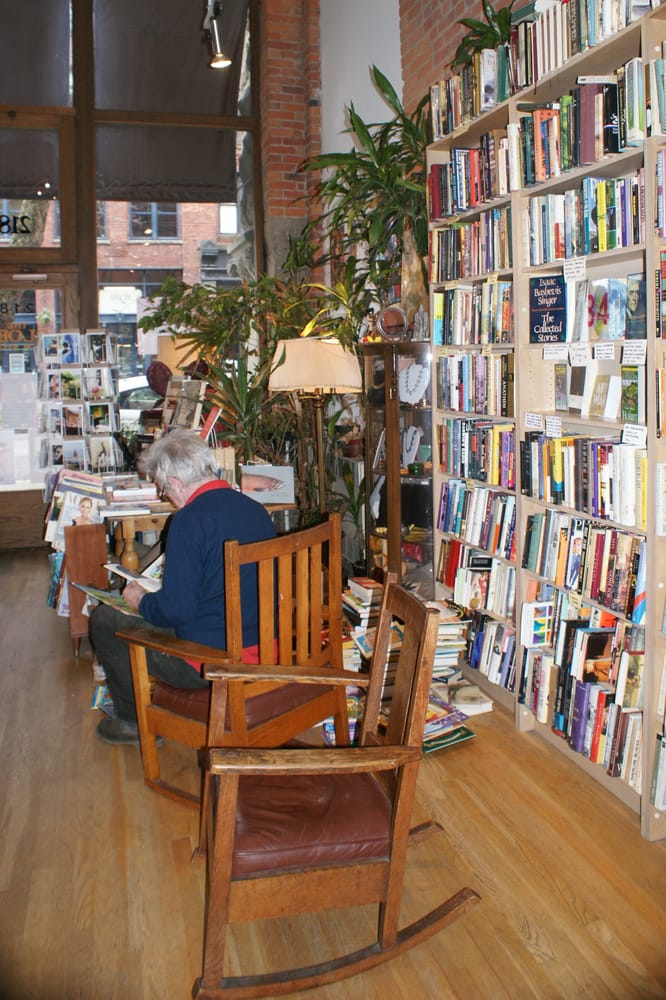
John Siscoe notes how books establish the human bonds between people that create community in invisible ways. In a bookshop, people feel accepted and trusted and will start talking, thinking and sharing. “The social contract that we seem to have lost in so many ways is alive among the bookshelves,” he said. “A good bookstore is the essence of the social contract. I watch other people interact with one another, and then other people start talking. It’s a delicate art.”
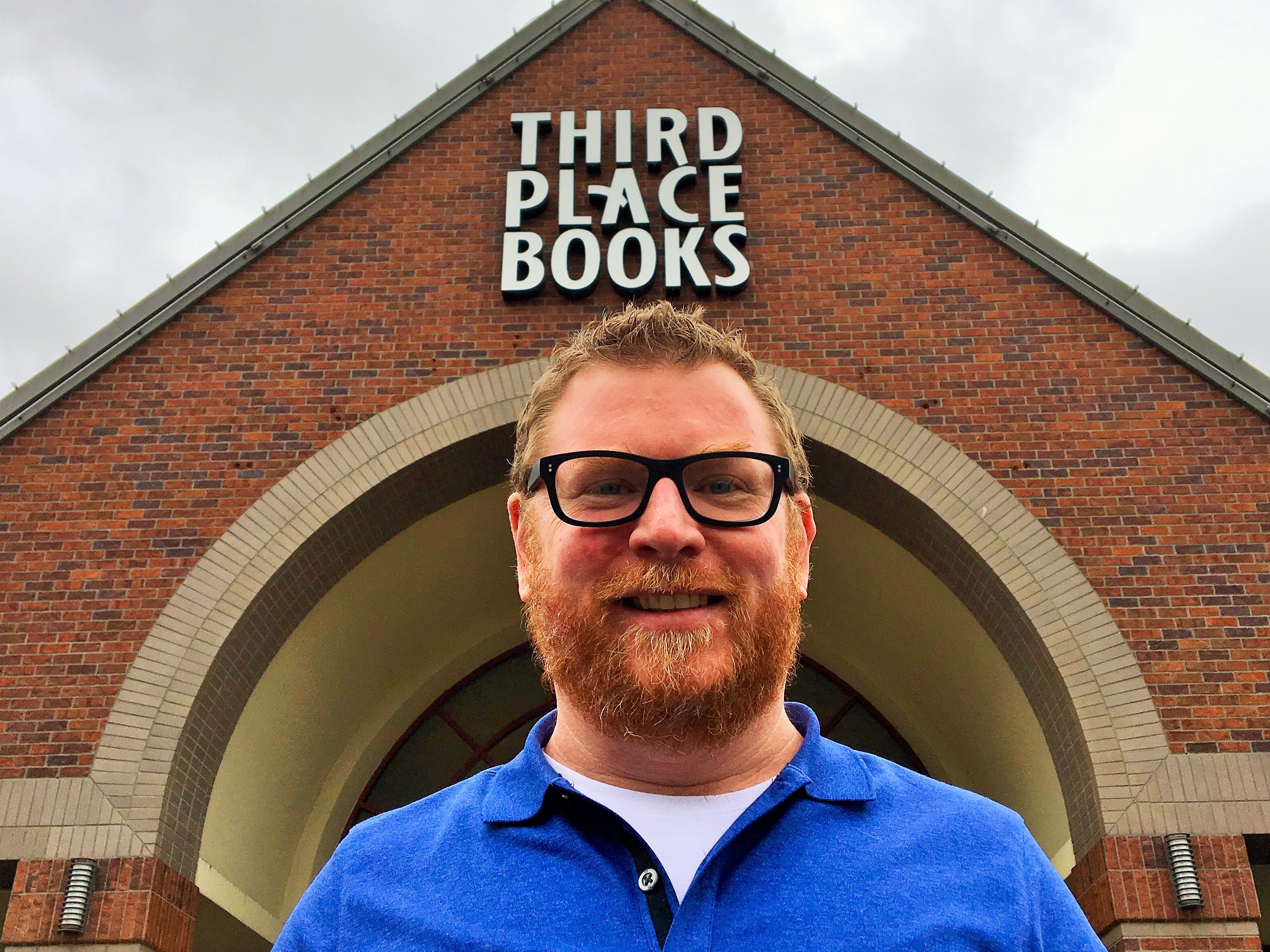 Robert Sindelar, Managing Partner of Seattle’s Third Place Books, speaks of the many community connections that are happening in the bookstore. “Our staff gets to know our customers. Within an hour at least one customer will tell another customer about the book that was recommended to them.”
Robert Sindelar, Managing Partner of Seattle’s Third Place Books, speaks of the many community connections that are happening in the bookstore. “Our staff gets to know our customers. Within an hour at least one customer will tell another customer about the book that was recommended to them.”
Anyone who buys books from Amazon suffers from a post-modern syndrome that can be coined as chronic algorithm fatigue. Say you buy a book from Amazon about equestrians in Argentina. The book is a gift for a distant relative whom you barely know, a one-time buy. You will be followed forevermore by random pics of horse books on every device you own. In a world that is dominated by screens, it is a relief to have an experience in a bookstore where community connections are real and conversations about books become very important. In Sindelar’s words, “When I break away from the screen, I want an experience. I want to touch and feel and see. To make it more meaningful. People want to take the time to have a more thoughtful discussion. An exchange of ideas.”
Indie bookstore owners, much more than purveyors of books, are curators who open our eyes to possibilities about books we had never before considered. John Siscoe recounts that the author and poet Richard Brautigan once told him, an unopened book is just a paper brick. Siscoe expounds further, “Yeah, if you don’t open a book, it’s just a decoration. You want to reach to a shelf and open a book. It’s a human activity. You’re not just picking up something that will look good on the shelf. It has to be something much more than that.”
Allison K. Hill, CEO of the ABA, cites indie bookstores as much more than retail stores. “They're community centers, cultural centers, neighborhood hangouts, and gathering places for people to discover books, talk about books, and be around books. For reluctant readers indie bookstores are especially important as they introduce people to other book lovers, reading culture, and passionate and knowledgeable booksellers who can recommend the perfect book, the book that could transform them into a reader.”
Through its “Boxed Out” campaign, the ABA is hopeful that regular consumers of books will become friends of bookstores, thereby spreading their wealth by buying books through their local bookstore, instead of just clicking through on Amazon. As Robert Sindelar said, “The biggest challenge is how to let your customer know if you spend all of your money with one retailer, eventually there will only be one retailer.” It’s important to clarify that book lovers are already inclined to buy books through their favorite indie bookstore. Consumers, however, might not be aware that they can order books through their local indie bookstore with as much as ease as they can click to buy books on Amazon.
Robert Sindelar of Third Place Books said, “All along we’ve been talking to our customers digitally and now they were thinking of us that way too.” As a result Third Place Books, which operates in three neighborhood locations in Seattle, has maintained 80% of their sales during the pandemic. The near total collapse of the old book world doesn’t have John Siscoe, owner of The Globe Bookstore, too concerned. “My business has always been small,” he says, “Five percent of the population, at best. That’s not changed. When you’ve been paying the rent since 1979 you have to be doing something right.”
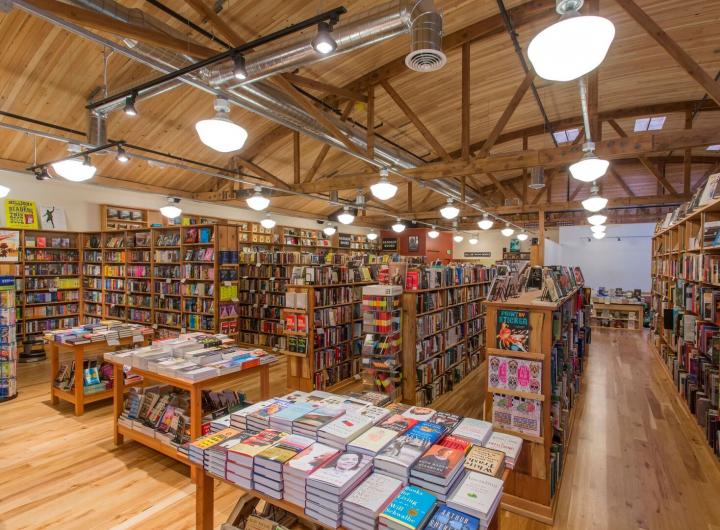 While books are much more than commodities, there is a pragmatic reality that must be looked at if indie bookstores are to stay in business. Allison K Hill of the ABA noted that Amazon generated approximately $10 billion in revenue on October 13 and 14 during its Prime Day promotion. Consumers buy from Amazon because of the convenience, but there is a significant consequence. The loss of indie bookstores causes the loss of local jobs and local dollars. There is also an unspoken loss that is not as tangible as the bottom line of a balance sheet. The real loss goes far beyond the boundaries of business. According to Hill, “There is the loss of community centers; and the loss of opportunities for readers to discover books and connect with other readers in a meaningful face-to-face way.”
While books are much more than commodities, there is a pragmatic reality that must be looked at if indie bookstores are to stay in business. Allison K Hill of the ABA noted that Amazon generated approximately $10 billion in revenue on October 13 and 14 during its Prime Day promotion. Consumers buy from Amazon because of the convenience, but there is a significant consequence. The loss of indie bookstores causes the loss of local jobs and local dollars. There is also an unspoken loss that is not as tangible as the bottom line of a balance sheet. The real loss goes far beyond the boundaries of business. According to Hill, “There is the loss of community centers; and the loss of opportunities for readers to discover books and connect with other readers in a meaningful face-to-face way.”
As a lifelong book lover, I’m a woman with a past. There was a time during my childhood when my hometown Yonkers did have indie bookstores. The Alicat Bookshop on 287 South Broadway in Yonkers was my first love. Books overflowed on tables and were piled high to the ceilings, so much taller than I could reach at age ten. The store smelled as musty as a pair of my grandfather’s old leather boots, finely crafted but cracking at the seams. I held a paperback classic in my hand, flipped the tattered pages, and for the first time in my life I made a book mine for a quarter. I owned this book and it became part of me. It took years before I could fully appreciate the French novel Nana. Emile Zola was a little over my head, but even then I longed to reach higher than my hands could grasp.
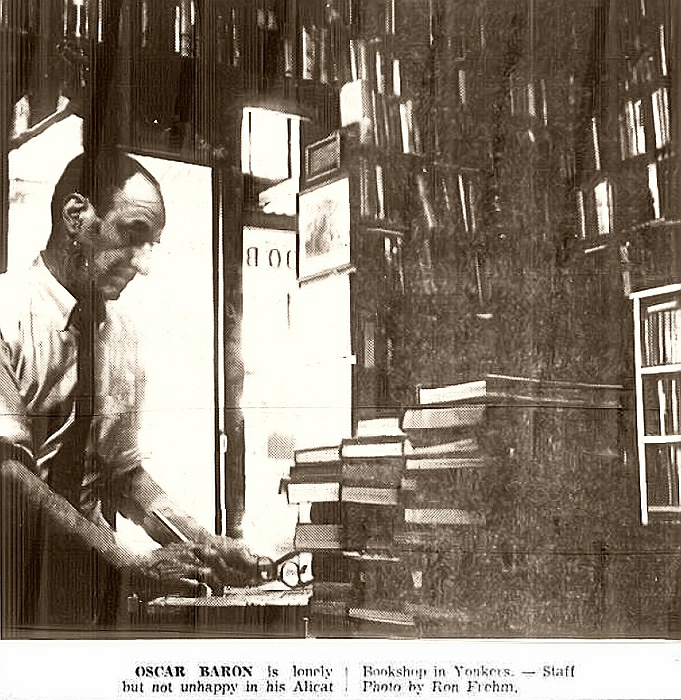 The Alicat was legendary in the book world. The bookshop had actually expanded into a small press, publishing a series of chapbooks with a limited print run of 750 copies that were each sold for a dollar. Alicat’s owners, Oscar and Florenz Baron, claimed to have been the first to publish Henry Miller’s works that had originally been banned in America. The Barons considered themselves to be moderately radical lefties who hobnobbed with the literary likes of Anais Nin, Dorothy Parker, William Carlos Williams and James Baldwin. But as a kid I didn’t know that. I did know that they sold brown-paper-wrapped mystery packages of eight or ten old books for a quarter. Buy, trade or sell, you could return two books for a new one. Due to a lease dispute with their landlord, the Alicat shut its doors in 1974. Oscar Baron died two years later, but Florenz Baron continued to sell books from her home on Ludlow Street in Yonkers well into the 1980s.
The Alicat was legendary in the book world. The bookshop had actually expanded into a small press, publishing a series of chapbooks with a limited print run of 750 copies that were each sold for a dollar. Alicat’s owners, Oscar and Florenz Baron, claimed to have been the first to publish Henry Miller’s works that had originally been banned in America. The Barons considered themselves to be moderately radical lefties who hobnobbed with the literary likes of Anais Nin, Dorothy Parker, William Carlos Williams and James Baldwin. But as a kid I didn’t know that. I did know that they sold brown-paper-wrapped mystery packages of eight or ten old books for a quarter. Buy, trade or sell, you could return two books for a new one. Due to a lease dispute with their landlord, the Alicat shut its doors in 1974. Oscar Baron died two years later, but Florenz Baron continued to sell books from her home on Ludlow Street in Yonkers well into the 1980s.
Since my days of falling in love with the Alicat, I have come to be smitten with many other indie bookstores, from Argosy in New York City to the Tattered Cover in Denver, Colorado, Cloud and Leaf in Manzanita, Oregon, and, of course, The Globe Bookstore and Third Place Books in Seattle.
With so many indie bookstores facing the possibility of extinction, there is a great need to convert consumers to become friends of bookstores. They might not become book lovers, but you never know. What is important is that we do our best to keep our communities built around books alive. The ABA “Boxed Out” campaign is fueled by display installations located at key indie bookstores in New York City, Los Angeles and Washington D.C. “Boxed Out is further bolstered on social media, where an awareness-building campaign has garnered a coalition of bookish influencers ranging from the Author’s Guild to the Book Industry Charitable Foundation (Binc), the Pen/Faulkner Foundation, along with booksellers from around the country, authors and media celebrities (like former news anchor Dan Rather), who are all proclaiming, “Don’t let the bookstores get Boxed Out.”
Boxed Out indeed. Saving indie bookstores has taken on the sheen of a cause célèbre movement. Its campaign message is now uttered with the same hue and cry as Vote! Wear a Mask! Support your bookstore! And we know if we rally together we can win. You can find your closest indie bookstore at IndieBound.org. Please join us this holiday season, and as always, keep our indie bookstores alive!
#
About Patricia Vaccarino
Patricia Vaccarino has written award-winning film scripts, press materials, content, books, essays and articles. She is currently writing a collection of essays NOTES FROM THE WORKING-CLASS. She has written two works of fiction about Yonkers: YONKERS Yonkers! A Story of Race and Redemption and its sequel The Heart of Yonkers. Book Three in the Yonkers series is in development. In addition, she frequently writes about libraries, and has written a monograph about the circumstances that led to the razing of the Yonkers Carnegie Library in 1982. The Death of a Library: An American Tragedy will be released in December 2020. She has an audience of 40,000+ followers on social media and divides her time between homes in downtown Seattle and the north coast of Oregon.
The American Booksellers Association (ABA)
Founded in 1900, the American Booksellers Association is a national not-for-profit trade organization that works to help independently owned bookstores grow and succeed. Our 1,750 bookstores act as community anchors; they serve a unique role in promoting the open exchange of ideas, enriching the cultural life of communities, and creating economically vibrant neighborhoods. For information about its “Boxed Out” Campaign Contact: Caroline Andoscia, Andoscia Communications - caroline@andoscia.com Dan Cullen, ABA - dan@bookweb.org. https://www.bookweb.org On Twitter @ABAbook
The Globe Bookstore
The Globe Bookstore offers books of good value, new and used, in the arts and sciences. Strengths include literature, history, children's titles, and cooking. Owned and operated by Carolyn and John Siscoe since 1979, the Globe is open during the pandemic from 12 to 4pm, every day except Sunday and Wednesday. The bookstore will be operating in its Pioneer Square through the holiday season at 218 1st Ave South, 98104. Selected books as well as some custom made shelving and other furniture is on sale at 50 % off. Its location in the University District is 5220 #B University Way, Seattle WA (on the east side of the street, across from the former University Heights School. Call (206) 682-6882 to verify hours of operation in either location. https://www.pioneersquare.org/the-neighborhood/retail/the-globe-bookstore
Third Place Books
Welcome to Third Place Books! Third Place Books is the deliberate and intentional creation of a community around books and the ideas inside them. Founded in 1998 in Lake Forest Park, we opened a store in the Ravenna neighborhood of Seattle in 2002, and another in the Seward Park neighborhood in 2016. Third Place Books is a general interest bookstore with over 200,000 new, used, and bargain books in Lake Forest Park and over 40,000 books in Ravenna. It is a fun, comfortable, and safe place to browse, linger, lounge, relax, read, eat, laugh, play, talk, listen, and just watch the world go by. Each of its three locations can be navigated from its main website https://www.thirdplacebooks.com. Call each location to verify any changes in hours of operation, which are currently 9am to 6pm, seven days a week.
#








